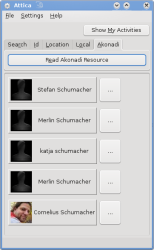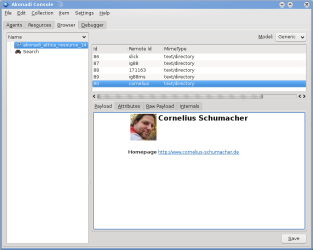We achieved two main results. First, we did a lot of work on the Open Collaboration Services API, which is a specification for a HTTP API for interfacing with community web sites. The specification is hosted on freedesktop.org, and opendesktop.org (which includes kde-apps.org and kde-look.org) has a first implementation of it.
Next, we implemented a desktop client for the API. Its working title is "Attica", after the Greek region where democracy was born. The client includes a library to access the API, an Akonadi resource for handling people data, a data engine for Plasma, and a GUI application mainly for testing the client library and the Akonadi resource. Attached screenshots show the application as it displays opendesktop.org people through Akonadi, and the Akonadi console with the debug view on the resource.
 |  |
Obviously there still is a lot to do. The client library for accessing the Open Collaboration Services API has to be extended to cover more of the API, the Akonadi support has to be completed and then of course we need more and better user interfaces.
One thing I would like to provide is something like a person widget, which can be used to easily integrate people into applications. It would give access to the community by providing links to related people, or could be used for direct communication.
Another thing which I would love to see is an application to view and interact with groups of people, which is a bit more oriented at the people and not so concentrated on the data as current addressbooks are. This could provide a more natural and useful way to interact with all the data about people which is distributed over the desktop and make it easier to keep in touch with people and keep track of what's going on in the different groups you are involved with.
Finally it would be fantastic to solve the problem of multiple data sets of the same person. The more person data we are able to pull in, the more frequently you get multiple entries of the same person in your addressbook. We need a way to merge these, so that there is only one entry per person containing the aggregated information. A possible way would be to use NEPOMUK for this and there already is some code which could be used to achieve this goal.
It will be interesting to see where this goes. There are lots of opportunities and the potential to implement unique new features for the desktop which take benefit of the fact that we have a fantastic community around our software.
 KDE Commit-Digest
KDE Commit-Digest